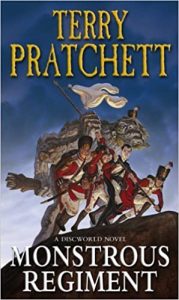I was going to post this video, but Charly beat me to it. The YouTuber Shaun posted an excellent discussion of the recent gender critical freakout: they tried to claim that Terry Pratchett would have favored their intolerant anti-trans bullshit. Neil Gaiman, Pratchett’s coauthor, responded; Pratchett’s own daughter, Rhianna, was horrified that anyone would abuse his memory in that way. I agree. How anyone could read Pratchett’s work and think he wasn’t completely accepting of trans folk is a mystery, unless it’s just that they never read his books at all.
Shaun (and Charly) recommend his book Monstrous Regiment as far more illustrative of his views — it’s about a regiment of diverse women who all enlisted in the military by pretending to be men. You can’t find a clearer example of a refutation of a phony authorial interpretation. To be honest, I found it to be one of the weaker Discworld books…but it’s often because it gets rather heavy-handed in its dismissal of forced gender roles. It is not at all subtle, which makes it even more ridiculous that GC/TERFs would think Pratchett would take their side.



I remember that book well. My major complaint was that some things in the plot eventually could be anticipated.
Well, these are the sort of people who use “red pill” with complete lack of awareness.
I t really pisses me off that good people like STP die young ,while RNJ’S like pat robinson reach their 90’s .
It’s one of my favorites. Yes, it was written when Pratchett was losing subtlety, but the whole feeling like you’re alone when it turns out that there are others like you after all, that spoke to me.
Pratchett?? Wot??? He was not just funny but wise, and his central theme was inclusiveness and self-expression. Look at the composition of the Guards — trolls, dwarves (one of whom was not exactly typically dwarfish), idiot humans, smart humans … may whoever sullied his name fall off the earth and get trampled by the elephants.
Not only that, but pretty much every book that includes Cheery Littlebottom makes a point about how gender “is more or less optional” for dwarves.
It’s also the book with an actual, human, non-allegorical trans man, depicted as a hero (if inglorious) and an authentic man.
I was quite stunned by the TERF who tried the “but what about his daughter????” argument on Rhianna Pratchett, Terry’s daughter. It didn’t go well for them.
I think it’s a difference between merely reading the books and actually understanding them. (Spoilers ahead, if anybody reading the comments here hasn’t read the books but wants to… which on this site is kind of unlikely in the first place, but you never know.) If you don’t pay any attention to the context of the book, Cheery Littlebottom gives up cross-dressing to present as her “biological” gender, which TERFs would approve, and the end of Monstrous Regiment has the main character reject a culture of cross-dressing, too. If you totally ignore the broader message of those books and all the others in the series you can present Pratchett as gender-critical.
As I said over on Affinity , there isn’t just a trans man in Monstrous Regiment, there’s also a 6 feet tall dwarf in the Guards, forgotten heir to the throne. To think that somebody who would write a character who crossed species draw the line at gender is ridiculous.
Vicar @9: The fun thing about female dwarfs (yes, with an ‘f’) coming out in the Discworld books is that other than the prominent examples of Cheery Littlebottom and Rhys Rhysson the reader can’t know what their biological sex is. When Madam Sharn says that as king of the mine she declares herself queen, nobody (with the exception of Pepe) has any idea if her declaration matches her biological sex or not.
Because she isn’t trans. She’s a woman in a deeply patriarchal culture who puts on a male guise in order to save her livelihood. Which is precisely another point transphobes usually don’t get. They accuse trans men of “trying to opt out of oppression”, which they hardly get anyway. It IS a problem when looking at historic figures who were amab and lived as male: Did they reject gender roles and tried to escape the hole society had dug out for them*, or were they trans? They rarely left us their own words, and if they did, they didn’t have access to our modern concepts and language which does, indeed, allow us to speak things into existence.
*Funny enough, political lesbianism is actually such an attempt.
At the end of Monstrous Regiment, Polly rejoins the military, and when she recruits other women she tells them they have a choice of serving as men or women, with the main advantage of serving as men being having access to better swear words. She has a choice, she chooses what suits her best, and informs others of their choices. She doesn’t reject cross-dressing entirely, only as a personal choice for herself when not necessary. (It would have been even better if we were shown men recruits being presented with the same choice as well, but I guess that would take longer in Borogravian society).
I feel like “cross-dressing” isn’t quite the right word for people disguising themselves as the opposite gender for practical reasons. Or as an umbrella term for cis people doing that and trans people presenting as their real gender, as both were likely happening in Borogravian army. (As Giliell notes above, the distinction can be highly elusive in these circumstances).
Presumably, if military service in Borogravia was officially opened to women/afab people, then the only afab people who still chose to serve as men would be either trans men or really fond of swearing. Incidentally, then men/amab people could presumably also serve as women about as easily as the other way round.